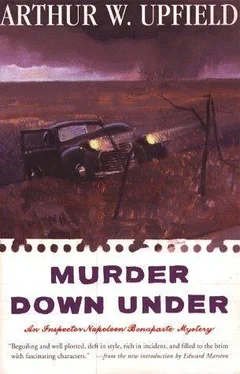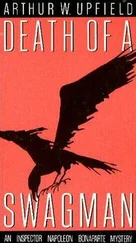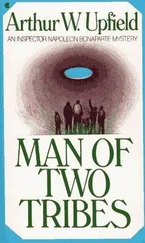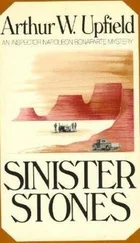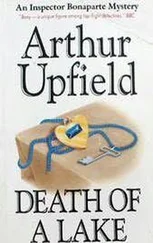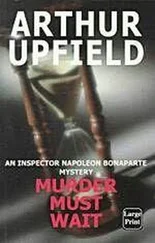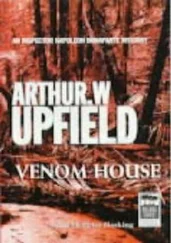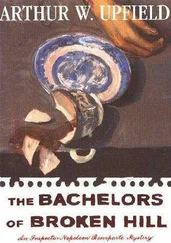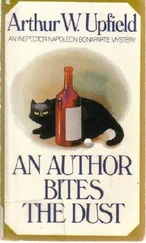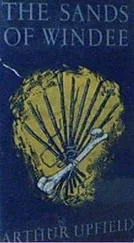Arthur Upfield - Murder down under
Здесь есть возможность читать онлайн «Arthur Upfield - Murder down under» весь текст электронной книги совершенно бесплатно (целиком полную версию без сокращений). В некоторых случаях можно слушать аудио, скачать через торрент в формате fb2 и присутствует краткое содержание. Жанр: Классический детектив, на английском языке. Описание произведения, (предисловие) а так же отзывы посетителей доступны на портале библиотеки ЛибКат.
- Название:Murder down under
- Автор:
- Жанр:
- Год:неизвестен
- ISBN:нет данных
- Рейтинг книги:3 / 5. Голосов: 1
-
Избранное:Добавить в избранное
- Отзывы:
-
Ваша оценка:
- 60
- 1
- 2
- 3
- 4
- 5
Murder down under: краткое содержание, описание и аннотация
Предлагаем к чтению аннотацию, описание, краткое содержание или предисловие (зависит от того, что написал сам автор книги «Murder down under»). Если вы не нашли необходимую информацию о книге — напишите в комментариях, мы постараемся отыскать её.
Murder down under — читать онлайн бесплатно полную книгу (весь текст) целиком
Ниже представлен текст книги, разбитый по страницам. Система сохранения места последней прочитанной страницы, позволяет с удобством читать онлайн бесплатно книгу «Murder down under», без необходимости каждый раз заново искать на чём Вы остановились. Поставьте закладку, и сможете в любой момент перейти на страницу, на которой закончили чтение.
Интервал:
Закладка:
The introductions accomplished, Mr Jelly invited them into his house, saying:
“Well, come along in. We’ve just had dinner, but there’s tea in the pot. I haven’t seen you around Burracoppin before. From what part of Australia do you hail?”
“Queensland, Mr Jelly. I knocked up a good cheque there breaking in horses, and saw in it an excellent chance to visit Western Australia. Unfortunately, I stayed a little too long, and now must make a cheque with which to get back again.”
“Horsebreaker, eh? Humph!”
While following his host through the kitchen door he glanced over his shoulder, to observe Hurley slowly following with one arm round the waist of Lucy Jelly and the other about the shoulders of little Sunflower.
The kitchen, evidently, was the dining-room. It was spotlessly clean, and austere in its furnishing. Bony was made to seat himself at the table and was given a cup of tea and offered a plate of small cakes. Mr Jelly lit the lamp. The world without was hushed to anunthrobbing silence.
“Bony is interested in ants, Mr Jelly,” Hurley remarked in his pleasant way. “I found him reading a book about them which has more Latin words in it than English.”
“Ah!” murmured Mr Jelly noncommittally, studying Bony in the lamplight.
“Ants always interest me,” Bony confessed. “The termite especially is a wonderful insect.”
The critical expression in Mr Jelly’s eyes of light blue was replaced by one of pleasure.
“You are correct, friend. I am delighted to find in you a man of intelligence. The termite was living, as doubtless you are aware, millions of years before man appeared, even millions of years before the Australian bulldog ant, which is the oldest ant. You will agree that the termite’s social laws are so far advanced beyond ours as to make ours merely the confusion of anarchy.”
“I am glad I came tonight,” Bony said, smiling.
“I am glad to meet a man who can discuss subjects other than horses, machinery, and wheat and the doings of our local society lights.”
“You have followed HenrySmeathman?” Bony asked.
“No, but I have read what Dr David Livingstone said about the termites of Africa. A great naturalist as well as a great missionary. But, come! Let us go to my little den and leave these younger people to entertain each other. Coffee at nine-thirty, Lucy, please.”
Again following Mr Jelly, Bony once more glanced back. Lucy Jelly was smiling happily. Sunflower Jelly was watching Bony with her big solemn eyes, the eyes of a Maid of Orleans or of a judge in ermine. Mr Eric Hurley closed one of his eyes as his generous mouth widened into a grin.
Carrying a lighted lamp, Mr Jelly led the way to a room at the farther side of the house. This room contained a plain oak bedstead with coverings, a desk, set against one wall angle, which was littered with papers and account books, a glass-fronted bookcase rarely seen in Australian farmhouses, and a large table set before the one window. The table was covered with a black cloth, and on it were several folio-size scrap or press-cutting albums, a pot of glue, writing materials, and an empty picture frame. Hanging on the walls was a gallery of framed portraits.
“This is Bluebeard’s chamber,” Mr Jelly was saying in his soft, soothing voice. “It is my private room. None of my household ever comes here. Well?”
“Here, I see, is the likeness of Maurice, the Longreach murderer, and there is Victor Lord, who killed a woman at Bathurst, New South Wales,” came from Bony, who was examining the pictures. “Surely, Mr Jelly, you are not a criminologist as well as a naturalist?”
“Indeed I am,” Mr Jelly admitted. “Of the two branches of science I am the more interested in criminology, but I do not neglect the science of agriculture. I do not permit my hobbies to interfere with the practice of my living. There are my children to be considered, and, my wife being dead, the responsibility is entirely on me. Yes, I have given much study to the lives of all those men whose pictures hang on those walls. All of them are murderers, and all of them have been executed. Study of the subject of homicide compels me to believe that it is the result of physical disorder. Sit down. If I can interest you, you will be an exception who will gladden my heart.”
“I am sure you will interest me,” Bony stated gently. He was actually more interested in Mr Jelly than he had been in a man for many years. To observe the farmer seated at the table with the soft light falling on his benign face, the ruddy complexion, the grey fringe of hair, and the light blue eyes, was to place him at a vast distance from such a hobby or life interest as homicide.
“Pardon my curiosity,” Bony continued, “but how did you secure all those pictures, for they are studio portraits?”
“They are photographic copies of newspaper pictures,” the farmer explained, adding with a sweep of his hand over the table: “Here I have their dossiers, accounts of their final trial and death. These albums are full of them, full of the greatest dramas in human life; accounts of men fighting for their vile lives, of women nobly swearing away their souls to save a man from the gallows, of innocent children facing a future where lies their father’s sin ready to crush them at an unexpected moment. Here, let us look at them, these fools who kill.”
Mr Jelly pushed aside the empty picture frame and drew towards him an album which he opened at random. Turning back a page, he revealed the original picture of a man named Fling. He said:
“Arthur Fling was the son of a parson and a highly respected mother. He had received a first-class education. He had great opportunities. Almost certainly he would have made his life successful. Why, therefore, should he coldly plan to and murder a man in order to gain two hundred pounds? Had his father known his need, he would have given his son the money. Result: the trap for the son, a broken heart for the mother, and an overdose of sleeping draught for the father.” The pages flickered. “Now, Henry Wilde was born in a Sydney slum of vice-ridden parents. For nine years he committed minor crimes. He shot at and killed a man who surprised him when attacking an office safe. His parentage urged him to crime and finally to the scaffold. The minor crimes produced the major crime. You follow me?”
“Easily,”assented the detective, who subconsciously was wondering at Mr Jelly’s concise speech. It almost seemed that the man’s speech was the result of training. He did not say, “cold-bloodedlyplan and murder a man”, and “shot and killed a man”, but “coldly plan to and murder” and “shot at and killed a man”. This subtle difference Bony was quick to notice. Mr Jelly continued:
“We have here two killers born in wholly different circumstances and living on quite different planes of life. On the surface the two are totally dissimilar, yet they are blood brothers to Cain. For a moment we will leave them. Here is William Marks who murdered three women at various times and places for their insurance money, and over here is Frederick Nonning of Charlton, Victoria, who killed five little children without motive. Nonning was a wealthy man; Marks was an artisan born of respectable parents.
“Now here we have four killers, no two of them in the same class of society. Two killed for money, one killed to avoid detention, and the fourth killed for the pleasure of killing. The question arises, why should all those men hang on my walls, why should they commit a deed which to you and me would be horrible even when contemplated? I’ll tell you. I’ll explain a theory which I think can be termed a fact.
“Murder is the visible expression ofan hereditary trait. On these walls are the pictures of twenty-seven killers. Of those twenty-seven cases I have been able to construct the genealogical tables of nineteen back to the fifth generation. In all cases save two the tables reveal lunacy and self-destruction. The descendant of such ancestors today faces the probability of the legal death.”
Читать дальшеИнтервал:
Закладка:
Похожие книги на «Murder down under»
Представляем Вашему вниманию похожие книги на «Murder down under» списком для выбора. Мы отобрали схожую по названию и смыслу литературу в надежде предоставить читателям больше вариантов отыскать новые, интересные, ещё непрочитанные произведения.
Обсуждение, отзывы о книге «Murder down under» и просто собственные мнения читателей. Оставьте ваши комментарии, напишите, что Вы думаете о произведении, его смысле или главных героях. Укажите что конкретно понравилось, а что нет, и почему Вы так считаете.
